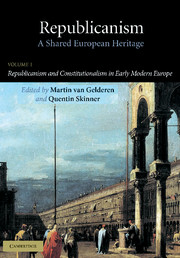Book contents
- Frontmatter
- Contents of Volume I
- Contents of Volume II
- Acknowledgments
- Introduction
- Part I The Rejection of Monarchy
- Part II The Republican Citizen
- Part III The Republican Constitution
- 9 From the Crisis of Civil Culture to the Neapolitan Republic of 1647: Republicanism in Italy between the Sixteenth and Seventeenth Centuries
- 10 Aristotelians, Monarchomachs and Republicans: Sovereignty and respublica mixta in Dutch and German Political Thought, 1580–1650
- 11 Debating the respublica mixta: German and Dutch Political Discourses around 1700
- 12 Classical Foundational Myths of European Republicanism: The Jewish Commonwealth
- 13 Republican Politics in Early Modern Spain: The Castilian and Catalano-Aragonese Traditions
- 14 The Idea of a Republican Constitution in Old Régime France
- 15 Republicanism, Regicide and Republic: The English Experience
- Bibliography
- Contributors
- Index of Names of Persons
- Index of Subjects
12 - Classical Foundational Myths of European Republicanism: The Jewish Commonwealth
Published online by Cambridge University Press: 15 December 2009
- Frontmatter
- Contents of Volume I
- Contents of Volume II
- Acknowledgments
- Introduction
- Part I The Rejection of Monarchy
- Part II The Republican Citizen
- Part III The Republican Constitution
- 9 From the Crisis of Civil Culture to the Neapolitan Republic of 1647: Republicanism in Italy between the Sixteenth and Seventeenth Centuries
- 10 Aristotelians, Monarchomachs and Republicans: Sovereignty and respublica mixta in Dutch and German Political Thought, 1580–1650
- 11 Debating the respublica mixta: German and Dutch Political Discourses around 1700
- 12 Classical Foundational Myths of European Republicanism: The Jewish Commonwealth
- 13 Republican Politics in Early Modern Spain: The Castilian and Catalano-Aragonese Traditions
- 14 The Idea of a Republican Constitution in Old Régime France
- 15 Republicanism, Regicide and Republic: The English Experience
- Bibliography
- Contributors
- Index of Names of Persons
- Index of Subjects
Summary
In 1985, in a famous essay on Dutch republicanism, Kossmann pointed out one of the most puzzling shortcomings of Pocock's history of republicanism: he showed that the Machiavellian paradigm and the Atlantic tradition are ‘not easily applicable in the only major republic which was formed and which survived in early modern Europe’, i.e. the Dutch Republic. Kossmann – the doyen of Dutch studies in the history of political thought – expressed his perplexities in a very polite manner, recognising the quality of Pocock's ‘exceptionally stimulating and enlightening’ work, though making a very pointed attack:
However, I wonder whether his decision to jump from the Italian city-states to late-seventeenth-century England and from there to America without taking account of the Dutch Republic has not led to too rigid a simplification of a historical development which was perhaps considerably more complex.
(Kossmann 1985: 484)Notwithstanding this promising start, Kossmann draws disappointing conclusions, stating that the theoretical explanation and justification of Dutch republicanism was in fact firmly based on conceptions developed outside the Netherlands and deeply influenced by foreign intellectual innovation.
Thus Kossmann points out the difficulty of ‘interpret[ing] the history of Dutch republican theory as a continuing tradition of its own’, since ‘it did not draw inspirations from its own intellectual past’ and ‘used vocabularies developed abroad’; he therefore concludes by denying the existence of ‘a peculiarly Dutch intellectual tradition which it would be correct to define as the Dutch paradigm’ (ibid.: 485–6).
- Type
- Chapter
- Information
- RepublicanismA Shared European Heritage, pp. 247 - 262Publisher: Cambridge University PressPrint publication year: 2002
- 10
- Cited by

